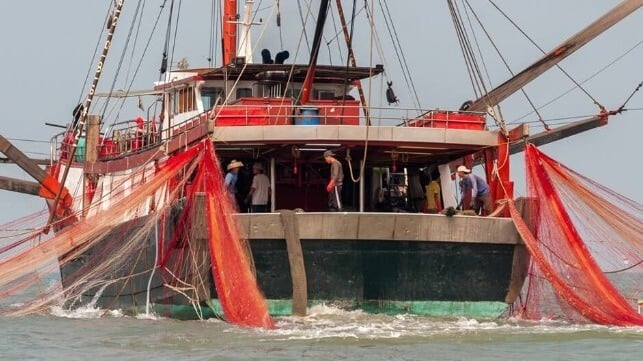Ghana Adopts a New Fisheries Law to Curb IUU Fishing

In the past decade, the scourge of IUU (illegal, unregulated and unreported) fishing in West Africa has grown into a billion-dollar trade, leaving local livelihoods in peril. Poor fisheries governance has seen industrial trawlers encroach in areas designated for artisanal fishermen, which has become a major threat for small pelagic fish. In Ghana for instance, IUU fishing has been estimated to cost the country between $14.4 million and $23.7 million annually. In 2021, the European Union issued a yellow card to Ghana, a warning that the country could lose access to the lucrative European seafood market unless IUU fishing is tackled.
It is in this context that Ghana last week adopted a new fisheries and aquaculture law. The legislation was passed by the parliament in July and was signed into law by President John Dramani Mahama on August 19.
Ghana’s Ministry of Fisheries and Aquaculture said that the landmark law is part of a wider government effort to avoid sanctions in key global seafood markets. “The law is crucial in maintaining Ghana’s access to global markets, where seafood has become one of the country’s fastest-growing non-traditional exports,” noted the Ministry. Recent data from the Ministry indicate that Ghana’s seafood exports have reached more than $425 million annually.
The campaign group Environmental Justice Foundation (EJF), which has been tracking IUU fishing in Ghana, also lauded the law as a bold step of leadership in the region. The Act safeguards livelihoods of over 200,000 small-scale fishers and millions of Ghanaians who depend on artisanal fisheries.
A notable reform by the new law is the expansion of the inshore exclusion zone (IEZ), doubling in size from 6 to 12 nautical miles off the coast. The IEZ allows local fishermen space to fish without competition from industrial trawlers. In the past few years, traditional fishers have faced immense competition from Chinese-backed trawlers, especially with the rise of ‘saiko trade’ in Ghana’s fishing industry. Saiko trade was formerly a traditional barter trade system where bycatch was exchanged for farm produce. The trade later transformed, and now involves industrial trawlers transferring frozen stocks of bycatch to small canoe operators for onward sale.

that matters most
Get the latest maritime news delivered to your inbox daily.
The practice is fueling depletion of small pelagics such sardinella, traditionally caught by artisanal fishermen and a staple food for local communities. In the past 15 years, average annual income per artisanal canoe has dropped by as much as 40 percent, according to data by EJF. In addition, over 90 percent of small-scale fishers have reported declining catches.
Early this year, Ghana attempted to rein in the industrial trawlers, a move that saw the government suspend fishing licenses of four Chinese vessels. The vessels were accused of unauthorized transshipment at sea (saiko trading) among other violations. The four vessels include Meng Xin 10, Florence 2, Long Xiang 607 and Long Xiang 608. The fishing ban will last for one year.
